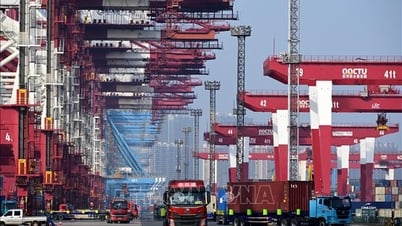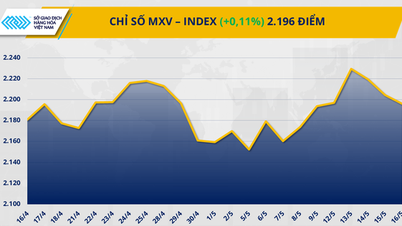As one of the agencies representing state capital owners, the State Capital Investment Corporation (SCIC) is facing a difficult question: "Is state capital in enterprises transferred to SCIC the capital of SCIC or the state capital?"
Comments on the Draft Law on Management and Investment of State Capital in Enterprises
As one of the agencies representing state capital owners, the State Capital Investment Corporation (SCIC) is facing a difficult question: "Is state capital in enterprises transferred to SCIC the capital of SCIC or the state capital?"
Commenting on the Draft Law on Management and Investment of State Capital in Enterprises (version 6), Mr. Nguyen Van Phuc, former Deputy Chairman of the Economic Committee of the National Assembly, is interested in the regulations on the State Capital Investment Corporation (SCIC).
What he is interested in is what SCIC is defined as, as the agency representing the state capital owner in enterprises, such as the State Capital Management Committee in enterprises or ministries, branches, localities or enterprises.
The reason for clarifying this is that if SCIC is considered as other administrative agencies representing state capital owners, it will greatly hinder the operations of SCIC - which must operate according to the provisions of the Enterprise Law and other laws, not administrative agencies such as ministries and branches.
In fact, Mr. Vo Tri Thanh, former Deputy Director of the Central Institute for Economic Management, analyzed that state ownership always has representative characteristics, meaning it is not the real owner but only a representative.
If in the role of administrative agencies, representing the State - or in other words, state capital is assigned to these agencies to represent ownership - for the purpose of giving the right to decide on capital management.
As for enterprises, state capital that has been assigned to enterprises must become the capital of the enterprise. Enterprises will be proactive in using, managing, and investing that capital according to the provisions of law and the enterprise's charter.
This is what Mr. Phuc wants to emphasize. It can be clearly seen that SCIC has different characteristics from administrative agencies that are tasked with representing the ownership of state capital. Therefore, state capital in enterprises assigned to SCIC must be recorded as SCIC's capital, appearing on the balance sheet of this enterprise, being the asset of the enterprise and the enterprise has the right to dispose of that asset.
It was not until the Draft Law on Management and Investment of State Capital in Enterprises was put forward for comments that the issue of state capital or enterprise capital arose a debate.
Five years ago, when Decree 10/2019/ND-CP on the implementation of rights and responsibilities of state ownership representatives was issued, it stipulated that SCIC is an agency representing state capital owners, such as the State Capital Management Committee at Enterprises or other ministries and branches, requiring clarification of SCIC's model.
At that time, many people wanted SCIC to be a business, operating in a completely different way and with different regulations than administrative agencies. However, if it were a business, where would SCIC’s capital come from?
Currently, Clause 9, Article 3 of the Law on Management and Use of State Capital Invested in Production and Business at Enterprises (Law 69) stipulates: “The capital of an enterprise in which the State holds 100% of the charter capital includes the enterprise's equity capital and capital mobilized by the enterprise”.
Clause 1, Article 29 of Decree No. 151/2013/ND-CP: “SCIC's equity includes: “b) Capital received at accounting book value from companies as prescribed in Article 7 of this Decree”;
Clause 5, Article 1 of Decree No. 147/2017/ND-CP amending Clause 2, Article 7 of Decree No. 151/2013/ND-CP stipulates: “The Corporation is responsible for fully reflecting the value of state capital contributed to enterprises that have received the transfer according to the capital value determined in the Minutes of handover of state ownership representation rights between the parties or the Minutes of adjustment of the handover of state ownership representation rights (if any)”.
Point b Clause 1 Article 65 Decree No. 148/2017/ND-CP stipulates: “During the operation, SCIC's charter capital may increase due to capital received at accounting book value from transferee companies”.
With the above regulations, Mr. Phuc commented that, in essence, the State's transfer of capital to SCIC is the State's contribution of assets (expressed as ownership of shares, ownership of capital contributions in state-owned enterprises) to SCIC (a one-member LLC model). After receiving the contributed capital, the State's ownership of shares, ownership of capital contributions in enterprises becomes the property of SCIC. The State owns SCIC and SCIC owns capital in the enterprises receiving the transfer.
But the reality is not so clear.
A Deputy General Director of an auditing company jokingly said that if SCIC's capital is considered to continue to be transferred as state capital, then SCIC will receive capital transfer without having any capital. If SCIC's equity is recorded at nearly VND 61,000 billion as it is now, and state capital is recorded in the balance sheets of enterprises to which SCIC receives capital transfer, it will lead to a situation where state capital transferred to SCIC is reflected in two independent legal entities, shown in the financial statements of the two enterprises. Specifically, for every VND 1 recorded for SCIC, there will be VND 1 state capital appearing in the enterprise that has transferred to SCIC.
SCIC is very aware of this situation. In the process of managing the operations of enterprises owned by SCIC, SCIC has sent documents to ask for opinions from competent authorities on the legal status of enterprises and their operating mechanisms. The Ministry of Finance has issued documents guiding this content.
Specifically, according to the provisions of Clause 9, Article 3 of Law 69, SCIC's capital in receiving enterprises is determined to be the capital of enterprises in which the State holds 100% of the charter capital.
The Ministry of Finance also acknowledged the fact that, in the past, SCIC still exercised the rights of member shareholders to contribute capital to the receiving enterprises according to the provisions of the Enterprise Law and relevant legal provisions; and managed capital at these enterprises according to the provisions of the law on capital management of enterprises in which the State holds 100% of the charter capital invested in other enterprises.
In addition, the regulation on “capital representative” also changes the concept from “state capital representative” to “SCIC capital representative”. This is a person appointed or authorized in writing by SCIC to exercise SCIC’s rights and responsibilities for part or all of the Corporation’s capital at other enterprises, including those appointed by competent state agencies as representatives and inherited or authorized by the Corporation to continue to act as representatives when receiving the right to represent state ownership at enterprises.
The Ministry of Finance also stated: "The representative of capital at enterprises in the management portfolio of SCIC is the representative of SCIC's capital at other enterprises (not the representative of state capital at enterprises".
It should also be mentioned that at the recent meeting of the National Assembly Standing Committee on the Draft Law on Management and Investment of State Capital in Enterprises, Vice Chairman of the National Assembly Nguyen Khac Dinh proposed to review the entire Draft to consistently reflect the ideas of Resolution No. 12-NQ/TW on continuing to restructure, innovate and improve the efficiency of state-owned enterprises.
The main idea is that the State does not directly intervene in the production, business and management activities of enterprises. State capital after being invested in enterprises is determined to be assets, capital of the enterprise.
Source: https://baodautu.vn/minh-dinh-dong-von-de-ro-quyen-cua-doanh-nghiep-nha-nuoc-d228837.html



![[Photo] Party and State leaders visit President Ho Chi Minh's Mausoleum](https://vphoto.vietnam.vn/thumb/1200x675/vietnam/resource/IMAGE/2025/5/19/d7e02f242af84752902b22a7208674ac)
![[Photo] Many young people patiently lined up under the hot sun to receive a special supplement from Nhan Dan Newspaper.](https://vphoto.vietnam.vn/thumb/1200x675/vietnam/resource/IMAGE/2025/5/18/6f19d322f9364f0ebb6fbfe9377842d3)
![[Photo] Ready for the top competitions of Vietnamese table tennis](https://vphoto.vietnam.vn/thumb/1200x675/vietnam/resource/IMAGE/2025/5/18/9c547c497c5a4ade8f98c8e7d44f5a41)
![[Photo] Party and State leaders attend the special art program "You are Ho Chi Minh"](https://vphoto.vietnam.vn/thumb/1200x675/vietnam/resource/IMAGE/2025/5/18/6895913f94fd4c51aa4564ab14c3f250)































































































Comment (0)